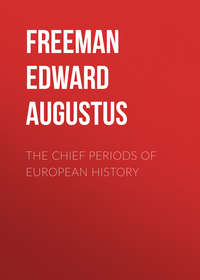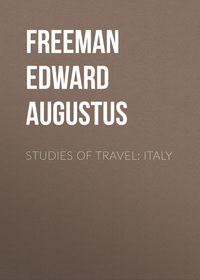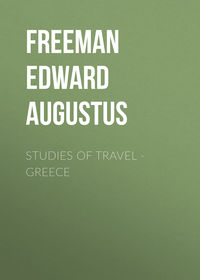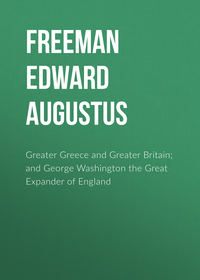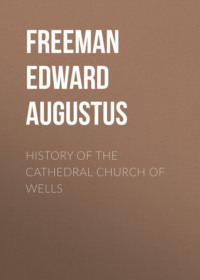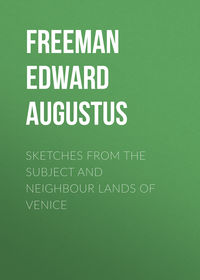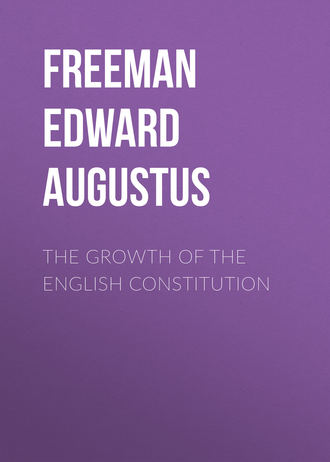 полная версия
полная версияThe Growth of the English Constitution
Out of this body, whose constitution, by the time of the Norman Conquest, had become not a little anomalous and not a little fluctuating, our Parliament directly grew. Of one House of that Parliament we may say more; we may say, not that it grew out of the ancient Assembly but that it is absolutely the same by personal identity. The House of Lords not only springs out of, it actually is, the ancient Witenagemót. I can see no break between the two. King William summoned his Witan as King Eadward had summoned them before him. In one memorable assembly of the Conqueror’s reign, we read that the great men of the realm were reinforced by the presence of the whole body of the landholders of England, whose number tradition handed down as sixty thousand72. But, as a rule, the Great Councils after the Norman Conquest bear the same uncertain and fluctuating character as the Gemóts of earlier days. In the constitution of the House of Lords I can see nothing mysterious or wonderful. Its hereditary character came in, like other things, step by step, by accident rather than by design. And it should not be forgotten that, as long as the Bishops keep their seats in the House, the hereditary character of the House does not extend to all its members. To me it seems simply that two classes of men, the two highest classes, the Earls and the Bishops, never lost or disused that right of attending in the National Assembly which was at first common to them with all other freemen. Besides these two classes, the King summoned other men to our early Parliaments, pretty much, it would seem, at his own pleasure. The right of the King so to do could not be denied; when all had an abstract right to attend, we cannot blame the King for specially summoning those for whose attendance he specially wished. But it would almost naturally follow that such a special summons would gradually be held to bestow an exclusive right, and that those who were not specially summoned would soon be looked upon as having no part or lot in the matter. But it is certain that it was long before such a summons was held to confer a hereditary, or even a lasting personal right. The King did not always summon the same men to every Parliament. Besides the Earls and the Bishops, others both of the laity and the clergy were always summoned, but the list of those who were summoned, both of the laity and of the lesser ecclesiastical dignitaries, constantly varies from Parliament to Parliament73. That the personal summons conveyed an exclusive hereditary right was one of those devices of lawyers of which so many have crept into our constitution. When the notion of hereditary right had once established itself, the formal creation of peerages by patent was a natural stage. Looking at the matter from this historical point of view, it seems to me simply wonderful how any one can doubt the power of the Crown to create life-peerages, or to regulate the tenure or succession of a peerage in any way that it thinks good.
The House of Lords then, I do not hesitate to say, represents, or rather is, the ancient Witenagemót. An assembly in which at first every freeman had a right to appear has, by the force of circumstances, step by step, without any one moment of sudden change, shrunk up into an Assembly wholly hereditary and official, an Assembly to which the Crown may summon any man, but to which, it is now strangely held, the Crown cannot refuse to summon the representatives of any man whom it has once summoned. As in most other things, the tendency to shrink up into a body of this kind began to show itself before the Norman Conquest, and was finally confirmed and established through the results of the Norman Conquest. But the special function of the body into which the old national Assembly has changed, the function of “another House,” an Upper House, a House of Lords as opposed to a House of Commons, could not show itself till a second House of a more popular constitution had arisen by its side. Like everything else in our English polity, both Houses in some sort came of themselves. Neither of them was the creation of any ingenious theorist, though we need not doubt that many of the several steps in the growth of each were, each in its own time, the work of practical statesmanship. Our forefathers had no theories; but men, each in his own generation, had eyes keen enough to see that such and such a change in detail would get rid of such and such an immediate evil, or would bring with it such and such an immediate advantage. Nay more, it has sometimes happened that a change which was brought in with an evil intent has in the end worked for good. Measures which were taken with a view of strengthening the power of the Crown have come in the end to widen the rights of the people. On the other hand, institutions which once answered a good and needful purpose have sometimes, through change of times, changed their nature and have become instruments of evil instead of good. But in neither case were the institutions of our fathers the work of abstract theory. They have therefore lived on, and they have borne good fruit. Our national Assembly has changed its name and its constitution, but its corporate identity has lived on unbroken. We can therefore at any moment reform without destroying. In France, on the other hand, institutions have been the work of abstract theory; they have been the creations, for good or for evil, of the minds of individual men. The English Parliament is immemorial; it grew step by step out of the older order of things. In France the older order of things utterly vanished; the ground lay open for the creation of a wholly new institution, and the States-General were called into being at the bidding of Philip the Fair74. Englishmen in the fourteenth and fifteenth centuries had no theories of the rights of man or of universal humanity. But when they saw a practical grievance, they called for its redress. Frenchmen in the fourteenth and fifteenth centuries had theories as magnificent as any that have been put forth in the eighteenth or the nineteenth. And they had even then already learned to do deeds of blood in the name of freedom and philanthropy75. Therefore French institutions have not lasted. The States-General lived but a fitful life from century to century, and they perished for ever in the Great Revolution. Since that time no French institution, no form either of the legislative or of the executive power, has been able to keep up a continuous being of twenty years. This difference has not been owing to any lack of great men or of noble purposes on the part of our continental neighbours. It has been owing, partly, we may believe, to differences in the inborn character of the two nations, partly to differences in the course taken by their several histories. In France the Kings gradually swept away all traces of older free institutions, and established a simple despotism in the Crown76. The French therefore have been left without any traditional foundation to build on. In all their changes for good or for evil they have been driven to build afresh from the beginning. Our Kings never wholly wiped out our free institutions; they found means to turn them to their own purposes, and to establish a practical despotism without destroying the outward forms of freedom. The forms thus lived on, and in better times they could again be clothed with their substance. We ever had traditional principles to fall back upon, a traditional basis to build upon. It would be hard to reckon up the number of Assemblies, Conventions, Chambers of Deputies, and Legislative Bodies, which have risen and fallen in France, while the House of Lords and the House of Commons have lived on, with their powers, their duties, their relations to the Crown, to the Nation, and to one another, ever silently changing, but with their continuous being remaining throughout unbroken.
But I would again point out that, while the growth of English institutions has thus gone on almost in obedience to a natural law, the wisdom, the foresight, the patriotism, of individual statesmen is never to be put out of our reckoning. There was a given state of things, and some man had keenness of sight to see what was the right thing to do in that state of things. Our Constitution has no founder; but there is one man to whom we may give all but honours of a founder, one man to whose wisdom and self-devotion we owe that English history has taken the course which it has taken for the last six hundred years. It might no doubt have taken that course without him; things might have come about as they did without any one man coming so prominently to the front; or, if he had not arisen, some other man might have arisen to do his work. But we need not speculate as to what might have been; it is enough that one man did arise to do the work, that there is one man to whom we owe that the wonderful thirteenth century, the great creative and destructive age throughout the world77, was to us an age of creation and not of destruction. That man, the man who finally gave to English freedom its second and more lasting shape, the hero and martyr of England in the greatest of her constitutional struggles, was Simon of Montfort, Earl of Leicester. If we may not call him the founder of the English Constitution, we may at least call him the founder of the House of Commons78. It was in his age that the new birth of English freedom began to show itself; it was mainly by his work that that new birth was not stifled before it had brought forth lasting fruits. Strange it may at first sight seem that the founder of the later liberties of England was not an Englishman. Simon of Montfort, a native of France, did for the land of his adoption what even he might not have been able to do for the land of his birth. And why? The land of his birth was – shall I say flourishing or suffering? – under the baleful virtues of the most righteous of Kings. Saint Lewis reigned in France, Saint Lewis the just and holy, the man who never swerved from the path of right, the man who swared to his neighbour and disappointed him not, though it were to his own hindrance. Under his righteous rule there could be no ground for revolt or disaffection. By surrounding the Crown with the reflected glory of his own virtues, he did more than any other man to strengthen its power. He thus did more than any other man to pave the way for that foul despotism of his successors whose evil deeds would have daily vexed his righteous soul. In England, on the other hand, we had the momentary curse, the lasting blessing, of a succession of evil Kings. We had Kings who had no spark of English feeling in their breasts, but from whose follies and necessities our fathers were able to wring their freedom, all the more lastingly because it was bit by bit that it was wrung. A Latin poet once sang that freedom never flourishes more brightly than it does under a righteous King79. And so it does while that righteous King himself tarries among men. But to win freedom as an heritage for ever there are times when we have more need of the vices of Kings than of their virtues. The tyranny of our Angevin masters woke up English freedom from its momentary grave. Had Richard and John and Henry been Kings like Ælfred and Saint Lewis, the crosier of Stephen Langton, the sword of Robert Fitzwalter, would never have flashed at the head of the Barons and people of England; the heights of Lewes would never have seen the mightiest triumph of her freedom; the pavement of Evesham choir would never have closed over the mangled relics of her noblest champion80.
The career of Simon of Montfort is the most glorious in our later history. Cold must be the heart of every Englishman who does not feel a thrill of reverence and gratitude as he utters that immortal name. But, fully to understand his work, we must go back somewhat before his own time, we must go back and trace how the sway of foreign invaders first made the path ready for the course of the foreign deliverer. I have shown in what state our Constitution stood at the time of the Norman Conquest. In that Constitution, be it ever remembered, the Norman Conquest made no formal change whatever. Nothing has had a more lasting effect on all later English history than the personal character and position of the Norman Conqueror. But it was not in the character of a legislator that the main work of William was done. His greatest work of all was to weld together the still imperfectly united kingdoms of our ancient England into one indivisible body, a body which, since his day, no man has ever dreamed of rending asunder. But this was not the work of any formal legislative enactment; it was the silent result of the compression of foreign conquest. So it was with William’s whole policy and position. He was in truth a Conqueror, King by the edge of the sword, but it was his aim in everything to disguise the fact. He claimed the Crown by legal right; he received it by the formal election of the English people, and he was consecrated to his kingly office by the hands of an English Primate. He professed to rule, not according to his own will, not according to any laws of his own devising, but according to the laws of his predecessor and kinsman King Eadward81. The great immediate change which was wrought under him was not any formal legislative change; it was the silent revolution implied in the transfer – the wary and gradual transfer – of all the greatest estates and highest offices in England to the hands of foreign holders. The momentary effect was to make Englishmen on their own soil the subjects of foreign conquerors. The lasting effect was to change those foreign conquerors into Englishmen, and to call forth the spirit of English freedom in a more definite and antagonistic shape than it had ever before put on. What was the real position of a landowner of Norman descent within a generation or two after the Conquest? He held English lands according to English law; in all but the highest rank he lived on equal terms with other landowners of English birth; he was himself born on English soil, often of an English mother; he was called on in endless ways to learn, to obey, and to administer, the laws of England. Such a man soon became in feeling, and before long in speech also, as good an Englishman as if he had come of the male line of Hengest or Cerdic. There was nothing to hinder even one of the actual conquerors from thoroughly throwing in his lot with his new country and with its people. His tongue was French, but in truth he had far more in common with the Englishman than with the Frenchman. He was but a near kinsman slightly disguised. The Norman was a Dane who, in his sojourn in Gaul, had put on a slight French varnish, and who came into England to be washed clean again. The blood of the true Normans, in the real Norman districts of Bayeux and Coutances, differs hardly at all from the blood of the inhabitants of the North and East of England82. See a French soldier and a Norman farmer side by side, and you feel at once that the Norman is nothing but a long-parted kinsman. The general effect of him is that of a man of Yorkshire or Lincolnshire who has somehow picked up a bad habit of talking French. Such men readily became Englishmen. We have the distinct assertions of contemporary writers, and every incidental notice bears out their assertions, that, among all classes between the highest and the lowest, among all between the great noble and the villain, the distinction of Norman and Englishman had been forgotten within little more than a hundred years after the time when King William came into England83. And presently other causes came to make all the sons of the soil draw nearer and nearer together. A new dynasty filled the throne, a dynasty which claimed by female descent to be at once Norman and English, but which, in origin and feeling, was neither Norman nor English84. Henry the Second, Count of Anjou through his father, Duke of Aquitaine through his wife, inherited also his mother’s claims on Normandy and England, but under him Normandy and England alike were but parts of a vast dominion which stretched from the Orkneys to the Pyrenees. Under the mighty, and on the whole the righteous, sway of the great Henry the worst side of this state of things did not show itself85. Under his sons and his grandson England felt to the full the bitterness and the blessings of the Conquest. The land was overrun by utter strangers; the men of Old-English birth and the descendants of the first Norman settlers both saw the natives of other lands placed over the heads of both alike. Places of trust and honour and wealth were handed over to foreign favourites, and every man in the land was exposed to a yet heavier scourge, to the violence and insolence of foreign mercenaries. Under John Normandy was lost86, and England again became the chief possession of the King of England. But neither John nor Henry learned the lesson. The personal vices of the father, the personal virtues of the son, worked to the same end as far as their kingdom was concerned. The King whose wickedness became a proverb, who surrounded himself with the kindred ruffians of every nation, and the King whose chief fault was that he could never say No to his wife or his mother, helped alike to call forth the spirit of resistance, to draw all Englishmen of whatever origin nearer together, and thereby to work out the great work of giving England a free and lasting Constitution. For such Kings we may well be thankful, but to such Kings we owe no thanks. Our feelings of personal thankfulness towards any of our later Kings begin only when a King arose who joined the political skill of Henry the Second to the personal virtues of Henry the Third, and who added to both a feeling of English patriotism, a ruling sense of right in public affairs, of which neither Henry ever felt the slightest spark in his bosom. Edward the First, the first of our later Kings who bore an English name and an English heart, was the first round whose name can gather any feelings of personal thankfulness. In him we see the first of our Kings of foreign blood who did aught for the growth of our constitutional rights in some other way than that of calling forth the spirit of resistance to his rule.
Thus it was that the misgovernment of our Angevin Kings called forth among all the natives of the land an universal spirit of revolt against the domination of strangers within the realm. And they called forth the spirit of revolt in another way, a way hardly less important, by their base subserviency to a foreign power in ecclesiastical matters. I have here nothing to do with theological dogmas, with their truth or their falsehood, but the ecclesiastical position of the nation forms a most important aspect of its history throughout these times. In Old-English times there can be no doubt as to the existence of an effective supremacy in ecclesiastical matters on the part of the Crown. The King was the Supreme Governor of the Church, because he was the Supreme Governor of the Nation. The Church and the Nation were absolutely the same; the King and his Witan dealt with ecclesiastical questions and disposed of ecclesiastical offices by the same right by which they dealt with temporal questions and disposed of temporal offices87. The Bishop and the Ealdorman, each appointed by the same authority, presided jointly in the assembly of the shire, and the assembly over which they presided dealt freely both with ecclesiastical and with temporal causes. One of the few formal changes in our Law which took place in the days of the Conqueror was the separation of the two jurisdictions of the Bishop and the Ealdorman. One of William’s extant laws ordained the establishment, according to continental models, of distinct ecclesiastical courts for the trial of ecclesiastical cause88. But more important than this formal change was the practical result of the Conquest in bringing England into closer connexion than before with the See of Rome. The enterprise of the Conqueror was approved by Hildebrand, and it was blessed by the Pope in whose name Hildebrand already ruled89. While William lived, the royal supremacy remained untouched, and, allowing for his position in a conquered land, we may fairly say that it was not abused. But in meaner hands the ancient power of the Crown as the representative of the nation was often abused and often disputed. Quarrels arose as to the limits of the ecclesiastical and the civil power such as had never been heard of in the old times. And we must remember that claims which seem utterly monstrous now were far from seeming monstrous in a state of things so wholly unlike our times. Even the claim of the clergy to an exemption from temporal jurisdiction in criminal cases had a very different look then from what it has now. The privilege thus claimed was by no means confined to the priesthood; it took in a large part of those among the people who were least able to defend themselves90. And when we think of the horrible punishments, death, and mutilations worse than death, which the courts of our Angevin Kings freely inflicted for very slight offences, we can understand that men looked favourably on the courts of the Bishops, where the heaviest penalties were stripes and imprisonment. In the disputes between the Crown and the Church, from William Rufus to Henry the Second, we find popular feeling always enlisted on the ecclesiastical side91. Nor need we wonder at this, when we find among the Constitutions of Clarendon, which King Henry strove to enforce and which Archbishop Thomas withstood, one which forbad the ordination of villains without the consent of their lords. That is to say, it cut off from the lowest class the only path by which they had any hope of rising to posts of honour and authority92. But from the reign of John onwards we get a new state of things. A foreign power stepped in, a power which had as yet meddled but little in the strictly internal affairs of England, and which, so far as it had meddled at all, had on the whole taken the popular side. In the latter days of John and through the whole reign of Henry the Third, we find the Pope and the King in strict alliance against the English Church and Nation. The last good deed done by a Pope towards England was when Innocent the Third sent us Stephen Langton93. Ever afterwards we find Pope and King leagued together to back up each other’s oppressions and exactions. The Papal power was always ready to step in on behalf of the Crown, always ready to hurl spiritual censures against the champions of English freedom. The Great Charter was denounced at Rome; so was its author the patriot Primate94. Earl Simon died excommunicate; but, in the belief of Englishmen, the excommunications of Rome could not hinder an English Earl from working countless signs and wonders95– a pretty convincing argument, one might deem, that the Bishop of Rome had no jurisdiction in this realm of England. Against King and Pope the whole nation stood united; clergy and laity, nobles and commons, men of Norman and men of Old-English birth, all stood together alike against the King’s foreign favourites and against the aggressions of Rome. The historians of the age, all of them churchmen, most of them monks, are all but unanimous on the popular side. Prelates like the Primate Stephen, like Robert Grosseteste of Lincoln and Walter of Cantelupe of Worcester, were foremost in the good cause; the two latter were among the closest friends and counsellors of the patriot Earl96. We see how old distinctions and old enmities had been wiped out, how all the sons of the soil were banded together in one fellowship, when we read the letter denouncing the abuses of the Roman See which was sent to that See in the name of no less a body than the whole Nobility, Clergy, and Commons of the English realm. In that letter, an out-spoken and truly English document, which has been preserved by an historian who well appreciated it, the writers set forth that, as the Nobles, Clergy, and Commons in whose name it is written have no common seal, they have, for the signature of their document, borrowed the seal of the city of London97.
This last fact brings me round to what I first spoke of long ago, what I may perhaps seem to have forgotten, but what I have in truth had constantly before my eyes, the distinctly constitutional reforms which we owe to Earl Simon of Montfort. The fact that a document which professed to speak in the name of all classes of the whole nation could not be so fittingly signed as with the seal of the city of London marks the place which that city held in the political estimation of the time. But London held that position only as the greatest member of an advancing class, as the foremost among the cities and boroughs of England. Now the great work of Earl Simon was to give those cities and boroughs their distinct place as one of the elements of the body politic. Let us trace the steps by which that great work was done. When we reach the thirteenth century, we may look on the old Teutonic constitution as having utterly passed away. Some faint traces of it indeed we may find here and there in the course of the twelfth century, as when both sides in the wars of Stephen and Matilda acknowledged the right of the citizens of London to a voice in the disposal of the Crown98. But the regular Great Council, the lineal representatives of the ancient Mycel Gemôt or Witenagemôt, was shrinking up into a body not very unlike our House of Lords. Its constitution, as I have already hinted, was far more fluctuating, far less strictly hereditary, than the modern body, but it was almost as far from being in any sense a representation of the people. The Great Charter secures the rights of the nation and of the national Assembly as against arbitrary legislation and arbitrary taxation on the part of the Crown. But it makes no change in the constitution of the Assembly itself. The greater Barons were to be summoned personally; the lesser tenants in chief, the representatives of the landsittende menn of Domesday, were to be summoned by a general writ99. The Great Charter in short is a Bill of Rights; it is not what, in modern phrase, we understand by a Reform Bill. But, during the reigns of John and Henry the Third, a popular element was fast making its way into the national Councils in a more practical form. The right of the ordinary freeman to attend in person had long been a shadow; that of the ordinary tenant-in-chief was becoming hardly more practical; it now begins to be exchanged for what had by this time become the more practical right of choosing representatives to act in his name. Like all other things in England, this right has grown up by degrees and as the result of what we might almost call a series of happy accidents. Both in the reign of John and in the former part of the reign of Henry, we find several instances of knights from each county being summoned100. Here we have the beginning of our county members and of the title which they still bear, of knights of the shire. Here is the beginning of popular representation, as distinct from the gathering of the people in their own persons; but we need not think that those who first summoned them had any conscious theories of popular representation. The earliest object for which they were called together was probably a fiscal one; it was a safe and convenient way of getting money. The notion of summoning a small number of men to act on behalf of the whole was doubtless borrowed from the practice in judicial proceedings and in inquests and commissions of various kinds, in which it was usual for certain select men to swear on behalf of the whole shire or hundred. We must not forget, though it is a matter on which I have no time to insist here, that our judicial and our parliamentary institutions are closely connected, that both sprang out of the primitive Assemblies, that things which now seem so unlike as our popular juries and the judicial powers of the House of Lords are in truth both of them fragments of the judicial powers which Tacitus speaks of as being vested in those primitive Assemblies. It was only step by step that the functions of judge, juror, witness, and legislator became the utterly distinct functions which they are now101.


